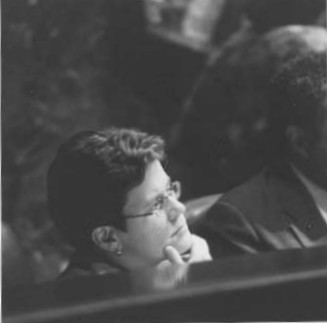Cathy Woolard
|
Cathy Woolard Born May 10, 1957 Atlanta City Council President, District 6 Candler Park, Georgia 55,000 constituents |
Career Overview Elected November 1997 Re-elected 2001; elected President by the Council
|
In Atlanta’s long struggle to provide domestic partner benefits, Council member Cathy Woolard joined the city as a plaintiff in a successful lawsuit that forced Georgia’s insurance commissioner to lift a statewide ban on domestic partner coverage in insurance policies.
Interview with Cathy Woolard for Out and Elected in the USA
Q: Tell me about your path to becoming an elected official.
A: I came to being an elected official through an odd route because I worked for the Human Rights Campaign for seven years. I was interested in politics before that. My grandfather had served as mayor of a small town here in Georgia, so I had some family background in politics. But I think working at the Human Rights Campaign both taught me the fundamentals of public policy as well as campaign skills. It really gave me the confidence to take on this race. It has really served me well. Frankly, all the time I spent working with HRC made my transition into being an elected official probably easier than it would have been otherwise. It was a wonderful by-product of having the opportunity to work for that organization. I was the first openly gay elected official in the state. I’m happy to report that there are now four other openly gay elected officials. We elected three this year, and a fourth one actually came out this week – a guy who has been mayor of small city called Pine Lake, which is in the Atlanta metropolitan area. Really happy with that – that now I can actually have a meeting of openly gay elected officials and other people besides myself will be there! We’ve got a caucus now!
Q: Has there been some specific organizing that has brought this about?
A: There really hasn’t been. Each of them ran relatively separate campaigns. I’m probably the only one of all of them that ran specifically as an openly gay person. I don’t think they were particularly in the closet, but that wasn’t an obvious part of their race. That is sort of qualified by degree in each particular instance. I’d like to think that the fact that my election broke the barrier, that somebody’s election broke the barrier – that one, it encouraged other people to run as openly gay; and two, to the extent that anytime somebody breaks through that barrier it sort of takes away some of the mystique. You know, people really have irrational prejudices, so it was helpful in that way. But it is significant because I think it really demonstrates our political power in a very real way. I think my election certainly did. To say now that we five people elected – I just think there’s going to be some real exponential benefits from it. That is as concrete an example of our political power in the area as anything I can imagine.
Q: How have you settled into your job?
A: It is going great. I think I’m a good match for the district – I don’t have a lot of difficulty representing it – I’m pretty square with the folks. My district seems to be pretty happy with me as best I can tell. And I really enjoy the challenge of it. I do represent more registered voters than any other member of the Council. They are really interested in civic affairs, so it keeps me busy. It has its challenges, but is fascinating for me – all of the policy. I love just about any issue – I’ve even spent most of the year working on some tax issues which I just never would have thought would be as interesting as it’s been.
Q: Do you have much of an identifiable gay and lesbian constituency?
A: Yeah, my district has long been known as the gay district – we did a poll before my campaign and I think between 15-18 percent of the district self-identified as gay. I don’t think by any stretch of the imagination you could call it “The Gay District” because there are so many gay parts in the metropolitan area, but it was certainly helpful.
Q: Are there any nice surprises in the work?
A: I think the thing that has been most interesting to me has been the alliances that I’ve made with members of the Council who folks would not necessarily see as being openly supportive of gay issues. There are some particularly conservative, personally conservative members who have become very good friends and really strong allies from the get-go. I’m proud of that – reaching across the personal divide. I’ve appreciated their mentoring me along the way.
Return to Out and Elected in the USA: 1974-2004 index • Go to next article
For information on a touring exhibit version of Out and Elected in the USA: 1974-2004, contact Ron Schlittler at rlschlittler@verizon.net.
